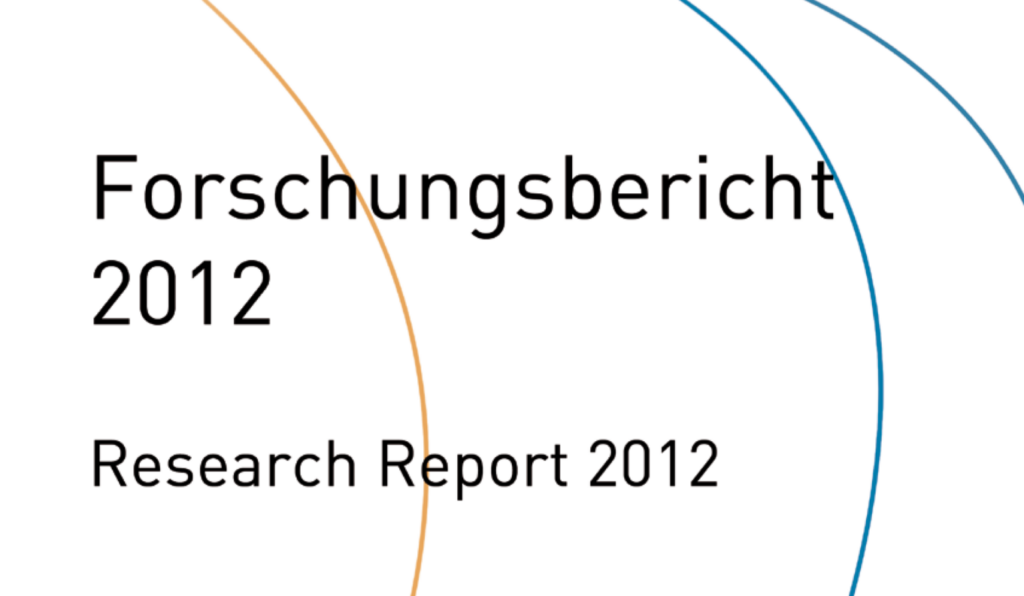
ZeMKI Research Report 2012
Editorial
At the Centre for Media, Communication and Information Research (ZeMKI) of the University of Bremen, the year 2012 was connected with several major changes and achievements: Stefanie Averbeck-Lietz took up her post as professor of communication and media studies with a focus on media change. This not just established another subject group at the ZeMKI, but also the former research lab „media history“ was extended to the lab „Communication History and Media Change“. In this way it was possible to anchor historical research on media, communication and the press at the ZeMKI and to create opportunities for its future development.
In addition to this organizational expansion, the year 2012 for the ZeMKI was marked by extensive activities in the field of externally funded research. Besides the various individual research and training projects featured in this report, particular mention should be made of the first funding phase of the priority programme 1505 „Mediatized World“, funded by the German Research Foundation (DFG) and coordinated by Friedrich Krotz. Two projects led by Andreas Breiter and Andreas Hepp („Mediatized Worlds organization in schools“ and „Mediatized everyday worlds translocal communitarisation: digital natives“) were successfully completed within the context of the program. In addition to the cooperation project, the start of the second funding phase saw the ZeMKI once again represented with two projects in the priority program besides the coordination project: first, a project for developing methods for qualitative long-term studies (headed by Friedrich Krotz and Andreas Hepp) and second, continuation of the project on the mediatization of communitization that is now focusing on older people and a comparison of media generations. Also, the ZeMKI was successful in securing the Summer School of the European Communication Research and Education Association (ECREA) for the next three years with the topic „Dynamics of Mediatization“. The funding for the first year will be assumed by the German Academic Exchange Service (DAAD). This illustrates ZeMKI‘s general commitment to the promotion of young researchers, which is also reflected in the seccessful completion of a total of five doctoral projects in 2012 (Bora Aksen, Marion Brüggemann, Sigrid Kanngießer, Laura Suna and Emese Stauke). A major highlight was – again – the international film symposium, organized by Winfried Pauleit together with the movie theatre City 46, on the topic „What is Cinema? Selection, Screening, Experience“. This event also included a doctoral workshop.
In addition, the year 2012 was characterized by the University of Bremen‘s involvement in the Excellence Initiative. Here, the ZeMKI took part in various initiatives and meetings concerned with the preparation and evaluation of the excellence application and now stands to benefit from the success of the University of Bremen in the Excellence Initiative. The ZeMKI subsequently receives support from the so called „Development Fund“ proposed in the University of Bremen‘s Institutional Strategy for future development. This serves to strengthen the field of communication and media studies and ZeMKI‘s collaborative research efforts, with two limited-term W2 professorships, initially for a period of five years. The proposed professorships are for „Communication and Media Studies with a focus on comparative cultural analysis“ and „Communication and Media Studies with a focus on innovative methods“. The appointments procedure had already begun by the end of 2012.
In 2011 the Academic Senate recognized the ZeMKI initiative „Communicative figurations“ as a profile-building research group of the University of Bremen. In November 2012 this research group organized an international symposium that brought some of the leading scholars of mediatization research to Bremen. The term „Communicative figurations“ also describes a research network of the Universities of Bremen and Hamburg together with the Hans-Bredow-Institute. The aim of the research network is to link together the complementary expertise of the two locations and to develop ideas and concepts for joint research. Work on this research network was further intensified in 2012, thus laying the foundation for the future development of the research centre.
We hope that this report provides some insight into the cooperation projects briefly described in the following, the variety of different individual research and training projects, the publications, lecture activities and commitment of the ZeMKI members. The growth in the number of members of the ZeMKI – 35 in 2011, rising to 48 in 2012 – underscores the dynamic growth of the research center.
The ZeMKI Research Report 2012 is available here.


